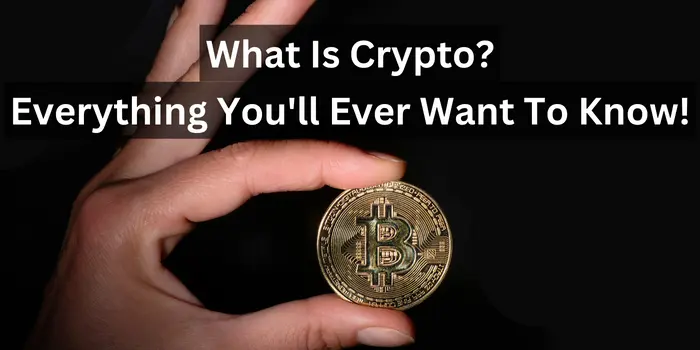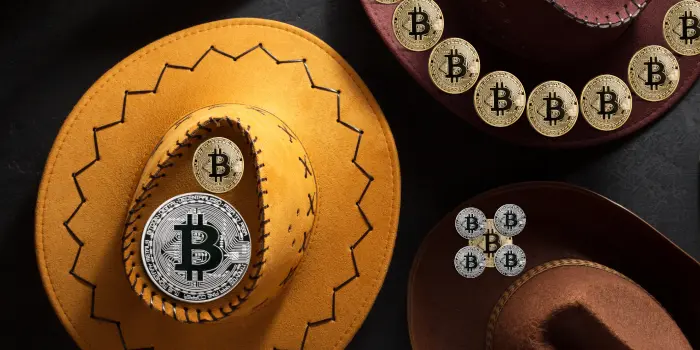
In today's interconnected, digital-first world, blockchain-based assets have taken center stage, creating a parallel universe teeming with potential and opportunity.
With this in mind, consider this guide your passport to this new frontier, your 'one-stop-shop' for all things related to these digital assets.
It's crafted to demystify the complexities of this emerging financial ecosystem, shining a light on each corner of the crypto world & beyond, and to ensure its all-inclusivity, I’ll be continually adding to it and refining it.
Have you ever pondered over what Cryptocurrency really is? Well, simply put, it's a digital form of money. But, unlike the dollar bills and coins we're used to, this money exists only in the virtual world.
This digital dough doesn't answer to any single authority, like a central bank or a government either. That's the decentralization part - it's like a power-sharing arrangement where no single player gets to make all the rules. The protection of these digital assets is done using a science called cryptography. This involves the use of complex algorithms to encrypt and secure the data. Think of it as an extremely complicated lock-and-key system. This aspect of cryptography is where the term 'cryptocurrency' originates from.
Now, you might wonder, how do we get this digital money? It's not printed or minted, so where does it come from? Cryptocurrencies like Bitcoin are 'mined'. This isn't the same as digging up gold from the ground, of course. Instead, it involves a network of specialized computers (referred to as nodes) solving complex mathematical problems. Think of it like a really intense digital treasure hunt.
Many cryptocurrencies also use a technology called a blockchain. Imagine a giant, public spreadsheet that records every transaction - that's essentially what a blockchain is. But what can you actually do with cryptocurrency? Some people use it to purchase items and services on the internet.
Yet, a significant number of people treat cryptocurrencies, especially Bitcoin, like digital gold, using it as a way to store their wealth.
Speaking of Bitcoin, it was the first fully operational cryptocurrency, despite there being several other preliminary attempts, with catchy names like B-Money and Bit Gold. The enigmatic figure behind Bitcoin, Satoshi Nakamoto, reportedly started the work on Bitcoin's code back in 2007.
Satoshi's identity is still a mystery - could be a man, a woman, or even a group of people. The crucial information about Bitcoin was first released in a white paper titled "Bitcoin: A Peer-to-Peer Electronic Cash System", authored by Nakamoto.
Interestingly though, the first real-world transaction using Bitcoin didn't happen until 2010. A programmer with the last name Laszlo exchanged a whopping 10,000 bitcoins for just two Papa John's pizzas. Given today's value of Bitcoin, that's one seriously expensive pizza party and should be enough to make anyone want to give up carbs… Haha!
In short, cryptocurrencies offer a new form of digital asset, powered by blockchain and cryptography, with Bitcoin as the trailblazer. It's a fascinating world to delve into, combining technology, finance, and a dash of mystery.

If you've ever heard of the California Gold Rush of the mid-19th century, where individuals swarmed to California in hopes of striking it rich by unearthing precious gold, then you already have a basic understanding of how cryptocurrencies work. Just replace gold with Bitcoin and the prospectors with computers, and you're pretty much there.
In the world of cryptocurrencies, these digital riches are also 'mined', but instead of wielding pickaxes and shovels, the miners use powerful computers, referred to as nodes. These nodes are scattered across the globe, working round-the-clock, crunching numbers, and solving intricate mathematical problems. This process, coupled with the finite nature of cryptocurrencies like Bitcoin, is why they're often dubbed 'Digital Gold'.
Now, once a transaction happens with these digital currencies, they need to be recorded. This is where cryptography and blockchain come into play. Picture a huge, transparent ledger, floating in the cyber world, noting down every transaction. That's your blockchain. And the transactions? They're all encrypted - coded in a language that only a unique key can decipher. It's like a secret diary that only you can read.
So, how do you keep this digital money safe? You use what's called a crypto key, stored in something known as a wallet. Just like physical wallets, they come in different forms. A 'hot wallet' is connected to the internet, a 'cold wallet' is not, and a 'paper wallet' is a physical print-out of your keys. It's like choosing between a wallet you carry around, a vault in a bank, or a secret map to your treasure.
You may ask, what can you do with cryptocurrencies? Well, some people use them to buy things online. But, given the nature of these digital assets - the way their value can shoot up or plummet down like a roller coaster ride - a lot of people prefer to trade them or simply buy and hold onto them. It's like buying gold or art, hoping that it will appreciate over time. Bitcoin, in particular, has gained popularity as a 'store of value', a digital nest egg for the future.
Are cryptocurrencies the same as real money?" If we wanted to keep it short and sweet, the answer would be a resounding "No!" That being said, they do share some similar traits: both have value, can be used to buy things, and are often held as investments. But that's pretty much where the similarities end.
Think about the money in your pocket - it's printed by governments. And just like a kid let loose in a candy store, they can print more of it whenever they want, which can sadly reduce its worth. Cryptocurrency, on the other hand, is a whole different ball game. It's essentially computer code - a complex series of zeros and ones. Born out of a desire to shift control from governments and big banks, it was designed to send money across the Internet and make financial transactions a breeze.
You know how when you send money digitally, it has to go through banks? Well, cryptocurrencies bypass this process. All you need is an internet connection, and you're good to go. This democratization of transactions is one of the things that makes crypto so appealing.
Cryptocurrency transactions are secured with some serious mathematical muscle, in the form of cryptography, on a system known as the blockchain, which keeps them safe and prevents double-spending. Though, interestingly enough, you can also have crypto without a blockchain - but that's a tale for another day.
Let's talk about supply. Traditional currencies are firmly under the thumb of the governments that issue them. But cryptocurrencies? They dance to their own tune. They're not controlled by any single entity and are created digitally, more often than not through a process known as mining.
Now, here's a little nugget of information: neither real money nor cryptocurrencies have any intrinsic value. They're not like gold or diamonds, backed by something physically precious. Cryptocurrencies get their backing from mathematical principles and the faith of their holders. Regular money, or fiat currency, is backed by the governments that issue it. But, if you ask me, it still requires a hefty amount of faith, especially when nothing is stopping those governments from cranking up the printing presses!
Speaking of value, both types of currency can experience changes in their market value, or volatility. However, as it stands, cryptocurrencies are riding the higher waves.
So, when you get down to brass tacks, yes, traditional money and cryptocurrencies do have some things in common. But they're more like distant cousins than identical twins. When the rubber hits the road, their differences come into sharp focus, setting them worlds apart.
Is investing in cryptocurrencies safe?" This question is a bit like asking if it's safe to cross the street. The answer is: It can be if you understand the rules and pay attention to your surroundings.
Cryptocurrencies, by design, aren't controlled or regulated by any one person, bank, or government since they are decentralized. But that doesn't mean they're just flying in the wind. They're created and secured in unique ways that can offer safety if managed properly.
A process known as 'crypto mining' brings most cryptocurrencies, like Bitcoin, into existence. This digital mining involves validating transactions through a network of specialized computers and then adding these transactions to a blockchain. So to accomplish this, those computers find solutions to highly complex hash puzzles born out of the art of cryptography.
Picture it as a giant game of Sudoku played by computers, and when they solve it, new transactions get added to the blockchain.
This blockchain acts like a virtual diary, keeping track of all transactions. Transactions are grouped into 'blocks', which are linked together like a regular chain.

The 'blockchain' confirms the order and exact timing of each transaction, making it a very secure process.
But it's not all smooth sailing. There are some choppy waters you need to navigate. The cryptocurrency market is known for its volatility – its prices can go up and down like a rollercoaster. And where there's money, there's always someone trying to scam you out of it.
Two popular scams to watch out for are the 'pump and dump' scheme and 'phishing' scams. So, this is what the (FTC) says regarding Phishing Scams:
“Phishing is a type of online scam that targets consumers by sending them an e-mail that appears to be from a well-known source – an internet service provider, a bank, or a mortgage company, for example. It asks the consumer to provide personal identifying information. Then a scammer uses the information to open new accounts, or invade the consumer’s existing accounts.”
Phishing scams involve tricking people into revealing sensitive information, like their private keys. Now, in a pump and dump, scammers hype up a lesser-known cryptocurrency, encourage others to buy it, then sell their shares when the price is high, causing the price to plummet and leaving others in the dust.
The private key is your golden ticket in the world of cryptocurrency. It's a unique series of numbers and letters that prove you own the crypto you say you do. It's important to keep this as safe as the crown jewels. This is often how thieves manage to steal cryptocurrency. So, remember the three S’s: keep it Safe, Secure, and Secret.
One good way to keep your private key secure is to store it in a cold wallet, a type of digital wallet not connected to the internet. They're considered more secure than their online counterparts, the hot wallets. Among cold wallets, the paper wallet is often seen as the Fort Knox of digital security.
So, if you handle your private keys with care, avoid scams, and keep an eye on the market's wild ride, your crypto journey should be relatively safe. As for its value in the long term, that's a waiting game since cryptocurrencies are still pretty new on the scene. So, strap in and enjoy the ride!

If you're wondering, "What's the use of cryptocurrency anyway?" – well, it's not just a fancy digital coin or an internet buzzword. Cryptocurrency has got a growing number of uses, and it's about more than just buying and selling.
First off, it's a means to pay for goods and services. The use of cryptocurrency as a payment method is gaining momentum, with more businesses (like WooCommerce & OpenCart via Flexa.network) starting to accept it. But that's not the only way people are using cryptocurrency.
Many folks are using cryptocurrencies for trading and investment, seeing them as a way to grow and store wealth. Think of Bitcoin, the first cryptocurrency. It's like the gold of the digital realm, limited in supply and hence carrying a perceived value, especially compared to some of the 'altcoins' (alternative cryptocurrencies) that don't have a cap on how many can exist.
Cryptocurrency also works like a digital carrier pigeon, carrying money across borders. It's a neat and low-cost way to transfer money anywhere with internet access, without needing banks or other financial institutions to step in. Plus, it's peer-to-peer, meaning it's just between you and the other person.
Gift-giving just got a digital twist, too. You can send cryptocurrency as a gift to your friends, family, or coworkers by sending it directly to their digital wallet or through a cryptocurrency gift card.
An interesting use of cryptocurrency is as a safeguard against asset seizure by overreaching governments. In countries where the government has gone a bit too far, cryptocurrency can provide a haven for wealth.
But let's not forget the tech underpinning cryptocurrency - the blockchain. This revolutionary technology is finding use beyond just supporting cryptocurrencies. It's making waves in areas like cybersecurity, finance, and insurance, to name a few.
So, cryptocurrency isn't just digital money – it's a versatile tool with a growing list of uses. And as we march further into the digital future, it looks like the possibilities are only going to expand.
Consider cryptocurrency like Bitcoin as a unique kind of digital money. Its creation, or "mining", involves a network of computers working together to solve intricate mathematical problems.
The safety of these transactions is ensured through encryption - think of it as an online safety box. Each transaction is locked up securely and noted on a public digital record called a blockchain.
The term "cryptocurrency" springs from the usage of "cryptography." It's like an online secret handshake, which only the computers involved can understand, keeping the transactions secure from any uninvited onlookers.
Bitcoin, the pioneer of cryptocurrency, was designed to be decentralized. This means that no one entity, like a government or bank, has control over it. It's the digital realm's version of a free-market economy.
One of the coolest parts? You can send Bitcoin directly to anyone worldwide, as long as they're connected to the internet. It's as simple as sending an email, but with money. This convenience opens up financial services and transactions to an unprecedented number of people.
Lastly, an interesting fact about Bitcoin is its limited supply, similar to rare commodities. That's why Bitcoin holds such value, much like a rare painting or an ancient artifact.
Cryptocurrencies, affectionately known as cryptos, are a form of digital money that's making quite a buzz these days. Designed using advanced mathematics and technology, these decentralized forms of currencies are becoming a global sensation. As of December 2022, there were over 21,910 different cryptos with a total value of about $850 billion! Let's take a closer look at the seven most popular ones using market cap “the total value of the present circulation of their tokens” as the foundation. (Stats from CoinMarketCap)
Think of Bitcoin as the first kid on the block. It was created as a way to make payments directly between individuals (like e-mailing money!). It's also considered an alternative to government-controlled currencies. Still reigning as the king of cryptos, Bitcoin boasts a hefty market value of $584.35 billion.
Ethereum is unique because it's more than just a digital currency; it's a whole network changing the game of cryptos. It's helping to innovate in areas like decentralized finance and applications. With a market value of $229.74 billion, many believe Ethereum is the future of the internet.
Tether started life as RealCoin before getting a name change. Owned by the Hong Kong-based company, iFinex, Tether is a special kind of crypto, known as a stablecoin. Its value is linked to the U.S. dollar, offering a sense of stability in the fluctuating crypto market. It's currently valued at $83.78 billion.
XRP is a bit different. It's not exactly a traditional crypto, nor is it a stablecoin. It's tied to a private company, making it a unique player in the market. Also, the U.S. Securities and Exchange Commission (SEC) is investigating Ripple and a couple of its executives for allegedly selling what they say are unregistered securities. Updated July 13, 2023: They received somewhat of a win in a Yin and Yang decision in the SEC court; since the court ruled that the institutional sale of tokens did violate federal securities laws but the sale of XRP tokens on exchanges and through algorithms didn’t constitute investment contracts.
Born in 2017, BNB has grown to become one of the world's most popular tokens. It can be used for transactions on the Binance exchange and for purchases on certain platforms. It's currently valued at $37.27 billion.
Another stablecoin, USDC, mirrors the value of the U.S. dollar. Launched in 2018, it is backed by short-term U.S. treasuries and dollars, offering a familiar entry point into the world of cryptos. Its market value is $26.84 billion.
ADA, often compared to a smaller version of Ethereum, focuses on the development of smart apps and contracts. With an eye on environmental friendliness, Cardano has a market value of $11.35 billion.
What started as a joke, Dogecoin now boasts a market value of over $9 billion, defying the punchline.
This interesting stablecoin, ranked 21st, is pegged to the dollar on a one-to-one ratio, offering stability and a market cap of $3.88 billion.
In a nutshell, the world of cryptos is diverse and growing. While their uses and values differ, they all offer a glimpse into a future where digital money may become a part of everyday life.
Alright, let's address the elephant in the room - have people become wealthy from investing in cryptocurrencies? The answer is a resounding 'yes.' At the moment, there are over 45,000 individuals who've hit the jackpot and become millionaires through cryptocurrency.
Predicting how many more crypto millionaires will emerge is a lot like trying to predict tomorrow's weather with absolute certainty; it's tricky and probably impossible. However, some big names in the crypto sphere have ventured to forecast where crypto, especially Bitcoin, is heading.
First up, we have Tyler Winklevoss, one-half of the famous Winklevoss twins. Back in 2020, during a CNBC interview, he suggested that Bitcoin might reach a whopping $500,000 within 10 years or less.
Then we have Chamath Palihapitiya, once a co-owner of the Golden State Warriors. He went a step further to predict that Bitcoin could hit a staggering $1,000,000 by 2037.
To cap it off, we have the optimistic Michael J. Saylor, the once CEO and current chairman of MicroStrategy, who believes that Bitcoin has the potential to reach an incredible market cap of $300T. That would make each Bitcoin worth about $14,285,714.
So, can cryptocurrencies make you wealthy? Well if these forecasts hold true, you bet they can, at least from a financial perspective. But as with any investment, it's important to remember that there are risks, so it's a good idea to do your research and always consult with financial advisors before leaping.

Does the world of crypto come with its own set of scammers? Sadly, yes. Just like other forms of investment, scams exist, as highlighted by recent stories, including the alleged one involving Sam Bankman Fried (and I use the word “alleged” loosely here). While such swindling can occur across any asset class, it's still essential to stay alert and cautious.
Take the case of Bernie Madoff, who manipulated the stock market for his fraudulent activities. In crypto, you might encounter similar Ponzi schemes, among other scams. So let's break down a few examples:
"Love Is Blind" Scam: Also known as the 'pig butchering scam,' it occurs when fraudsters form seemingly genuine romantic relationships to gain trust. They then convince their victims to send them crypto or lure them into phony crypto investments.
Wi-Fi Eavesdropping: This scam is just as it sounds. Cybercriminals intercept your confidential crypto information, like passwords or private keys, via unsecured Wi-Fi networks.
Fake ICOs: In this case, scammers offer a golden opportunity to invest early in a new cryptocurrency. However, once they get your money, they vanish into thin air.
Phantom Exchanges: Some scammers set up fake crypto exchanges offering enticing bonuses or freebies. Once you deposit your money, it disappears because the exchange was never real to start with.
To keep yourself safe, consider using a VPN (Virtual Private Network) to secure your online activities. Stick to well-known and trustworthy crypto exchanges. Beware of anyone pushing you to make a decision immediately, as genuine opportunities rarely demand such haste. Lastly, never send cryptocurrency to someone you don't know personally. After all, in the world of crypto, it's better to be safe than sorry.
Ever wondered why cryptocurrencies are drawing people in like bees to honey? There are many solid reasons behind this trend, and we're going to explain them in the most straightforward way possible.
To begin with, stepping into the world of cryptocurrency is not as hard as you might think. It's akin to learning a new smartphone app - initially, it might seem a bit intimidating, but once you understand the basics, it becomes second nature. Just remember, it's smart to start with a small portion of your savings until you become proficient. And, like trying any new endeavor, it's best to consult an expert - a financial advisor in this case - before you dive in headfirst.
Another major draw is diversification. Investing in cryptocurrencies can be like adding an exotic new spice to your financial stew. Since they aren't linked to traditional financial markets, their value doesn't directly correlate with the ups and downs of the stock market. This gives them the potential to perform well even when other investments are struggling.
Cryptocurrencies also offer transactional freedom. Think of it as a digital wallet that you can tap into any time you need it. And with the backing of blockchain technology, which records transactions with full transparency, every transaction is visible to all parties involved, ensuring fair play.
Now, it's no fun having money you can't spend, right? Thankfully, many businesses are starting to accept cryptocurrencies like Bitcoin, which means your digital money can be used in practical, everyday situations.
Cryptocurrencies, especially Bitcoin, are considered reliable for maintaining their value. Just as there are only so many Fabergé eggs in the world, there's a finite amount of Bitcoin that can ever exist. This limits the ability of governments or political entities to tamper with its value.
Lastly, the decentralization of cryptocurrencies is a key attraction. They're not under the thumb of any one person, group, or government. Also, a great many of them have a fixed limit set by complex algorithms, unlike fiat money, or regular money which is very different from Crypto.
This means their value isn't susceptible to inflation, nor can they be seized by a government entity. The potential for high returns on investment also adds to the appeal, as some cryptocurrencies have demonstrated impressive growth over time.
Cryptocurrencies, like Bitcoin, follow the basic principles of monetary exchange. They're grounded in simple math and transparent record-keeping, making them a trusted medium for transferring value. Also, with its capped supply, Bitcoin should hold and increase in value over time.

The age at which you can start buying and dabbling in cryptocurrency can differ based on where you live and which platform you want to use. In the United States, for most crypto trading websites, you've got to be at least 18 years old, but some might even have higher age limits.
It's crucial to stick to these rules as they'll ask you to prove who you are before you can buy anything. This is a way for them to prevent scams and ensure the buyer isn't lying about their identity. Some platforms even offer additional safety nets for youngsters, like parental controls, accounts controlled by parents, and time restrictions, to prevent any unintended or wrong cryptocurrency deals.
Let's say a 12-year-old wants to invest in cryptocurrency and their parents are okay with it. This is possible, given that the platform they want to use allows it. There are protective steps in place to make sure the investment and the kid are safe. These include things like parents or guardians having to prove their identity, setting limits on how much money the kid can invest, needing parental approval for transactions, and teaching kids about the potential risks involved with investing in cryptocurrency.
It's essential for kids to use trusted and safe exchanges to keep their money safe from theft, scams, and other threats. Good exchanges usually have solid security measures, like two-step verification, cold storage, and strong security rules. They also offer learning resources to help kids understand the risks and get a better understanding of the technology behind cryptocurrency.
The age limit for investing in cryptocurrency is set by the rules and regulations in the country or region where you live. These age restrictions are there to protect kids from risky investments that they might not fully understand or be able to afford.
In the United States, the Securities and Exchange Commission (SEC) has set the minimum age for all investors at 18, regardless of how much they know about finance. Brokers need to make sure investors understand the risks tied to cryptocurrency investments before they let them buy anything. This is similar in many European countries, where you typically need to be at least 18, although some places might have stricter rules.
While there's no specific legal age to own cryptocurrency, it's generally advised that kids avoid investing in cryptocurrency markets on their own. Cryptocurrency investments can be very unpredictable and risky, and they can lead to significant losses. But if a kid is interested in investing in cryptocurrency, it's a good idea to do it under the watchful eye of an adult. An adult should be there to give advice, keep an eye on the child's investments, and make sure the child is only using money they can afford to lose.

Bitcoin is a type of digital money or cryptocurrency, that isn't under the thumb of any government, group, or person. This is different from regular money like the U.S. dollar, which is controlled by central banks and governments. Bitcoin works on a network between peers, without needing middlemen like banks. All the transactions are recorded in a shared digital ledger called the blockchain, and they're anonymous.
Who's got the power then? Well, it's actually the Bitcoin users and the network itself. The network consists of nodes, run by people all over the world using Bitcoin software on their computers. These nodes keep an eye on transactions and make sure the network is safe.
Because of how Bitcoin is set up, no one person or entity can call the shots or take control of the network. Bitcoin is governed by its users coming to a collective agreement. Anybody can create or improve the Bitcoin software, but for any changes to be made, most nodes have to agree on the updates. This process of coming to a consensus makes sure the network works smoothly and securely.
Bitcoin governance is kind of like a voting system, where the majority rules. Every node in the network has an equal say, and decisions are made together. If a new version of the Bitcoin software is suggested, it needs the majority of nodes to approve it for the changes to take effect. If there's a disagreement, different software versions can lead to forks, where the network splits into separate paths. But, the strongest network, with the most users, miners, and developers, will always win out in the end.
But, while Bitcoin itself isn't controlled by anyone, there are outside factors that can affect its price. Things like supply and demand, the state of the economy, how investors are feeling, and competition from other cryptocurrencies can impact how much Bitcoin is worth. However, the control and governance of the Bitcoin network stay with its users, making sure it stays independent from centralized authorities.
In a nutshell, Bitcoin is controlled by its users who run nodes, and decisions are made by majority rule. The fact that Bitcoin isn't controlled by any one entity or authority is what makes it unique compared to traditional money. This gives Bitcoin more transparency, security, and independence.

Even though cryptocurrencies like Bitcoin have a lot of advantages, they also have some drawbacks that you should know about before you decide to invest.
One big problem with cryptocurrencies is how much their value can change. It's like a rollercoaster ride – one minute, the price is up, the next, it could come crashing down. This is what we call 'Bitcoin volatility'. It makes investing in cryptocurrencies risky because these price changes can happen fast, meaning you could make a lot of money, or you could lose a lot. The price is influenced by many things, like how much demand there is for it, how investors are feeling, and changes in laws and regulations.
Another issue is that cryptocurrencies don't have any real or intrinsic value. Unlike regular money or physical assets like gold, cryptocurrencies aren't worth anything in themselves. Their value is only based on how much people are willing to pay for them, which makes them easy targets for price manipulation and adds more risk for investors.
Security is also of concern. Although the technology behind cryptocurrencies, called blockchain, is secure, there have been cases where hackers have attacked cryptocurrency exchanges and wallets. These attacks have led to huge amounts of cryptocurrency being stolen. To keep digital assets safe from hackers, the security infrastructure and practices need to be constantly improved.
The fact that the cryptocurrency market isn't regulated by the usual financial authorities is another concern. This means there are no standard rules to protect investors, increasing the risk of fraud, scams, and market manipulation. It could also be a problem for investors if they need to dispute a transaction or take legal action.
One more issue is scalability, or how much the infrastructure supporting cryptocurrencies can handle. As more and more transactions are made, the current infrastructure struggles to keep up. To compete with regular payment systems like Visa and Mastercard, cryptocurrencies need to be able to handle a lot of transactions. Proposed solutions like lightning networks, sharding and staking aim to fix these scalability problems, but they require complex technological advancements.
Cryptocurrencies also have a big environmental impact. The process of mining cryptocurrencies, especially in proof-of-work systems, uses a lot of computational power and energy. This has raised concerns about how sustainable cryptocurrencies are, and whether more environmentally-friendly alternatives are needed.
The fact that cryptocurrency transactions aren't completely anonymous is another concern. While the transactions are recorded on a public ledger, the blockchain, they can still be traced and linked to individuals with additional information. This lack of total anonymity can lead to interference from government authorities or regulatory bodies.
Finally, newbies to the cryptocurrency market are at risk. Losing your private keys, which let you access your digital wallets, could mean losing everything. There's also the risk of phishing attacks and hacking attempts. These are common in the cryptocurrency world, and inexperienced investors who don't know what to look out for could fall for these scams.
So in summary, while cryptocurrencies offer unique advantages, they also come with several downsides. Investors should carefully consider the volatility, lack of inherent value, security risks, regulatory uncertainty, scalability challenges, environmental concerns, privacy implications, and vulnerability to scams before engaging in cryptocurrency investments. It is crucial to consult a financial professional, conduct thorough research, and exercise caution to mitigate these risks and make informed investment decisions.

Figuring out which countries are using Bitcoin the most isn't an easy task, but companies that study the blockchain, like Chainalysis, have come up with ways to measure how different countries are adopting cryptocurrencies. To do this, Chainalysis looks at several things, like how much cryptocurrency is held in exchanges, how much trading is happening on these exchanges, the volume of peer-to-peer transactions, and how much cryptocurrency is being used in DeFi (Decentralized Finance) protocols.
They also consider the average buying power of people in each country by using the "purchasing power parity" (PPP) standard. This allows them to accurately assess countries where people might not have a lot of disposable income, but still use a significant portion of their income on cryptocurrencies.
Based on Chainalysis' research in 2022, the 20 countries where people are adopting cryptocurrencies the most are Vietnam, Philippines, Ukraine, India, United States, Pakistan, Brazil, Thailand, Russia, China, Nigeria, Turkey, Argentina, Morocco, Colombia, Nepal, United Kingdom, Ecuador, Kenya, and Indonesia (listed in order from 1 to 20 in the overall ranking).
Of these countries, the United States is a major player in the Bitcoin market. Even though the laws around cryptocurrencies are still unclear, a lot of Americans are participating in the Bitcoin market. Major exchanges like Coinbase, Circle, and Kraken are seeing a rise in registrations from the U.S. The high level of wealth and the ongoing development of new technology in the country contribute to its leading position in the Bitcoin market.
Other countries that are showing a lot of interest in digital assets and cryptocurrencies include Japan, South Korea, and the island city-state of Singapore. They are showing signs of embracing cryptocurrencies, such as having crypto ATMs, favorable policies around cryptocurrency, a strong startup culture, and a fair tax system. Singapore, in particular, is benefiting from being a global financial hub, which puts it in a good position to become a global hub for crypto too.
However, it's important to remember that the situation with cryptocurrencies can turn on a dime. Things like changes in regulations, trends in the market, and new technological developments can affect how and where cryptocurrencies are used over time.
There's a lot you can buy with cryptocurrencies like Bitcoin these days, despite the fact that some well-known companies, such as Overstock, Microsoft, and Twitch, no longer take Bitcoin. Still, many businesses do accept Bitcoin directly for their products and services. This includes companies like CheapAir.com, Virgin Galactic, and CryptoExchange.
CheapAir.com, a website where you can book flights, has been a fan of Bitcoin since 2013. They accept Bitcoin and several other cryptocurrencies as payment. Most big airlines don't accept crypto because of how quickly fuel prices can change, but CheapAir.com believes in the long-term potential of Bitcoin as a useful way for travelers to pay for their flights.
Virgin Galactic, run by billionaire Richard Branson, even allows you to use Bitcoin to buy tickets for space travel. It's literally aiming for the stars with your Bitcoin. Branson is interested in cryptocurrencies because he's always looking to explore new and innovative areas.
CryptoExchange is a marketplace where you can buy luxury goods like expensive sports cars, fancy watches, and unique domain names with Bitcoin. It's a place for people looking to buy something special using their crypto.
Etsy, an online marketplace for crafts, doesn't officially accept Bitcoin, but some sellers have found a way around this. They can use the "accept other payment methods" option on their profiles to let buyers know they'll take Bitcoin as payment, as long as the buyer agrees.
BitPay, a company that processes crypto payments, works with over 250 businesses that accept Bitcoin. Some people feel that BitPay's decision to convert Bitcoin into regular money goes against the original idea of Bitcoin as a universal currency. But, you can still use your Bitcoin to buy things like Uber rides, games from GameStop, Spotify plans, and more from these businesses.
There are lots of things you can buy with Bitcoin. Expedia and CheapAir.com let you book flights and hotels using Bitcoin. Smaller businesses, both in-person and online, might also take Bitcoin, especially if the owner is interested in cryptocurrencies. Services like Shopify and Square let these smaller businesses accept crypto payments. Websites like WordPress.com, Newegg.com, Etsy.com, and Overstock.com also let you use Bitcoin to pay.
You can even use Bitcoin to buy more luxurious items and experiences. Besides Virgin Galactic, you can buy concert tickets, book yacht trips, buy jewelry, invest in real estate, and even buy gold and silver with Bitcoin. And as more people start using cryptocurrencies, more options will become available.
BitPay makes it easy to spend your crypto. You can use your Bitcoin to shop directly with companies that accept Bitcoin, buy gift cards for popular stores, or get the BitPay Card, which lets you spend Bitcoin just like regular money wherever Mastercard is accepted.
Just keep in mind that these options might not always stay this way. Companies can change their policies, and new companies might start accepting Bitcoin, while older ones might quit. But the fact that more and more businesses are starting to accept cryptocurrencies shows that Bitcoin is becoming more widely accepted as a way to pay.
If you've got some Bitcoin and want to turn it into cash, there are several ways you can do this:
Online exchanges: The easiest way to change your Bitcoin into cash is by using an online exchange, such as Coinbase, Binance, FTX, or Kraken. These websites allow you to sell your Bitcoin in exchange for normal money, like U.S. dollars, after that, you can transfer them to your bank.
Brokerage apps: If you've got your Bitcoin in an app like Robinhood or Webull, you can simply sell your Bitcoin on the app and the cash will be added to your account.
Direct trading: You could also sell your Bitcoin directly to someone else using a direct trading website like Binance P2P or Paxful. These websites connect people who want to buy and sell Bitcoin and offer a range of payment methods, including cash, gift cards, or other digital currencies.
Bitcoin ATMs: Some cities have Bitcoin ATMs where you can convert your Bitcoin into cash. All you have to do is send your Bitcoin to the QR code the ATM gives you, and it'll give you cash. Just be aware that these ATMs usually charge high fees.
Trading for another cryptocurrency: If the exchange you use doesn't allow you to convert your Bitcoin directly into cash, you can trade your Bitcoin for another popular cryptocurrency like Tether (USDT) first. Then, you can convert this cryptocurrency into cash more easily.
Crypto debit cards: Some companies offer crypto debit cards, like the BitPay Card, that allow you to spend your Bitcoin directly. These cards take money from your crypto wallet and convert it into regular money for everyday transactions.
Trading with individuals: Websites like Bisq or LocalBitcoins allow you to trade Bitcoin directly with other individuals, which can sometimes mean lower fees. Just be careful and do your best due diligence to avoid any scams.
Money transfer apps: Some money transfer apps, like Cash App and PayPal, let you buy, sell, and cash out your Bitcoin all within the app.
Spending at Bitcoin-friendly businesses: Some businesses accept Bitcoin as payment. You can use your Bitcoin to buy things directly from them, although this doesn't actually turn your Bitcoin into cash.
When you're deciding how to turn your Bitcoin into cash, think about things like fees, how quickly the transaction will go through, how secure it is, and whether the payment method you want is available. Make sure to do your research and only use trustworthy platforms to keep your money safe.

It seems that a good number of wealthy folks, especially those from the younger generation, are jumping on the cryptocurrency train. Recent surveys show that more than 80% of young millionaires have invested in digital currencies, like Bitcoin.
The CNBC Millionaire Survey tells us that young millionaires are particularly fond of cryptocurrencies. In fact, 83% of them have dipped their toes in the crypto pool. Older millionaires, however, don't seem to be as enthusiastic about it. This has caused a bit of a stir among companies that manage big bucks.
Joanna England, in her article, "Five reasons why millionaires are back investing in Bitcoin", mentioned an interesting study from the deVere Group, a financial services company. According to this study, about 82% of millionaires are eager to learn more about investing in Bitcoin.
The study reveals more fascinating insights too. It seems that even when the crypto market faced a rough patch in 2022, eight out of ten high-net-worth individuals asked their financial advisors about adding cryptocurrencies to their investment portfolio.
So I believe the answer is clear. Do millionaires invest in crypto?... Yesss! Since 83% of young millionaires are crypto owners and 80% of wealthy folks, in general, want to learn more about it or are thinking of adding it to their portfolio (even after a down cycle); I think it's safe to say that the rich have indeed bought a ticket to board the crypto super train!